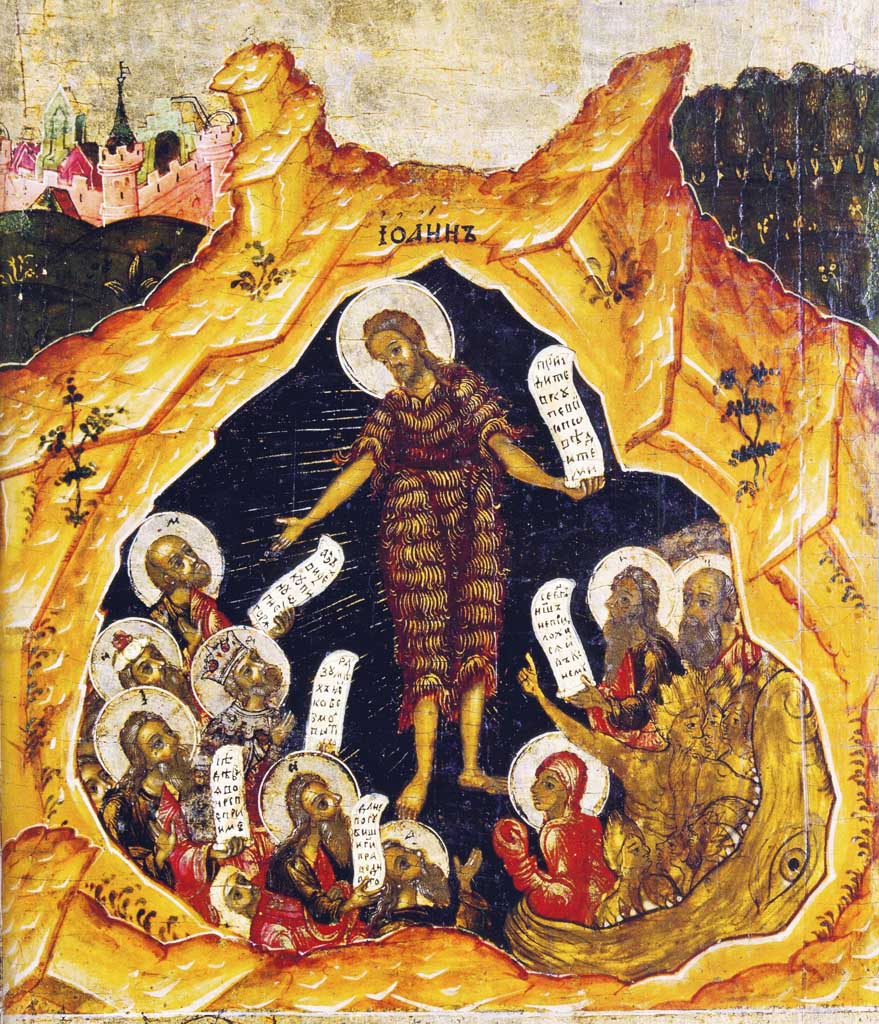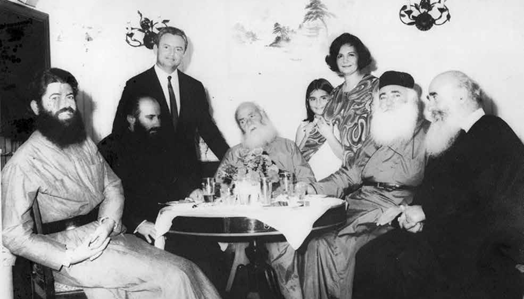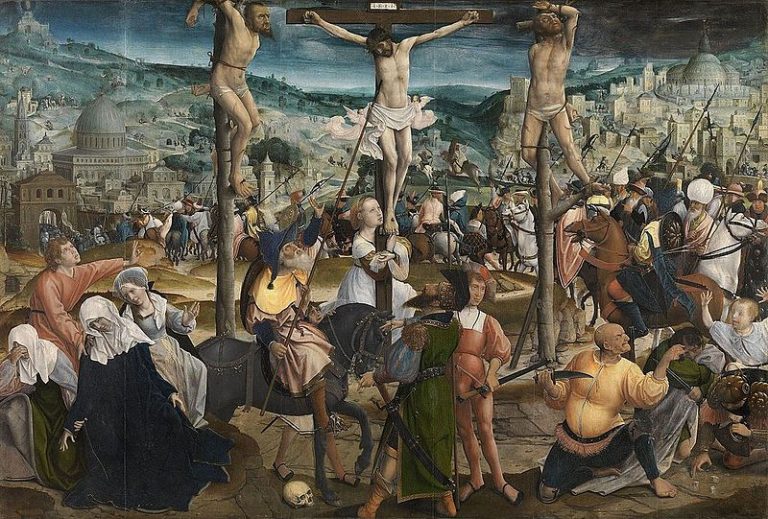Saint John the Baptist: a model of missionary work
The story of St. John does not begin at his birth – as is the case with ordinary people – but as an integral part of God’s plan, as an essential part in the work of His Divine Economy, it first appears in the Old Testament, among those foretold by the prophet Malachi: “Behold, I will send my angel before thy face, who shall make thy way before thee” (3:1; 4:4-5). Then, and in the New Testament, the birth and purpose of his life is foretold by the angel to his father Zechariah in the following: “For he is great in the sight of the Lord, and drinketh not wine and cup, and is filled with the Holy Ghost, even from his mother’s womb, And many of the sons of Israel shall he return unto the LORD their God, and he shall go forth before him in the spirit and power of the sun, returning the hearts of the fathers unto the children, and shall return the hearts of the fathers unto the children, and shall return in the fear of the righteous, preparing a people prepared unto the LORD” (Lk. 1:15-17). According to the angelic message, John will prepare for the coming of the kingdom of God and by preaching will bring many of the Israelites back to their Lord and God. John could be described as the first (chronologically) missionary of the New Testament, since he is the first to undertake this blessed ministry of leading people to Christ.
The priest Zechariah and his wife Elizabeth “were”, according to the evangelist, “righteous both before God, walking in all the commandments and rights of the Lord without fear” (Lk. 1:6). “Righteous in the Bible is called the godly, the God-fearing and righteous, the man of God. It is emphatically noted that the Baptist’s parents were both pious before God, according to the judgment of God who is a judge of hearts.”[1].
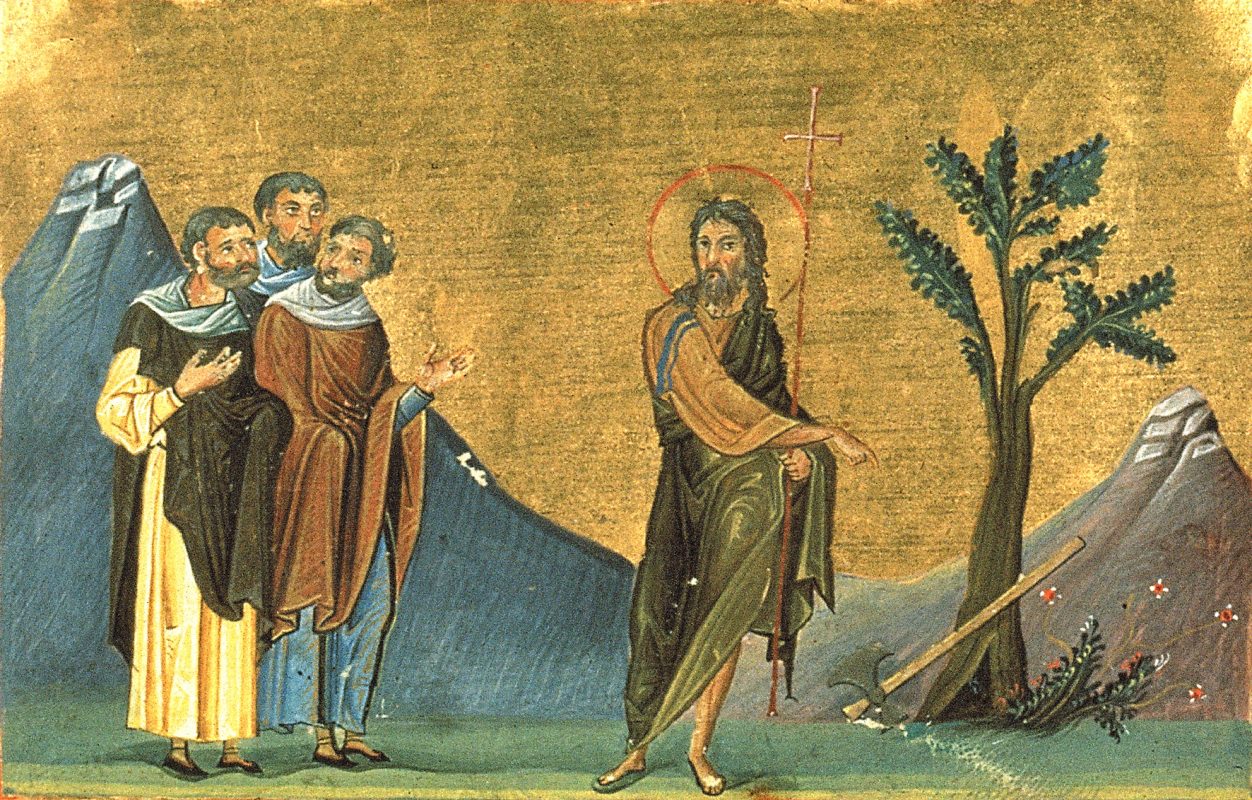
Elizabeth miraculously conceived John in her womb as not only she and her husband were both in old age, but according to Luke she was also barren (Luke 1:7). St. Gregory Palamas, commenting on the miracle of his conception, writes: “And when his conception drew near, not a man but an angel flew down from heaven and dissolved the sterilization of Zechariah and Elizabeth.”[2].
For his youthful years, the Archbishop of Thessaloniki, Saint Gregory, says: “Because the world was not worthy of him, he lived from childhood, we could say, constantly in the deserts, living an austere life, unconcerned, living only for God, seeing God only, making God his hole. He lived… in a place as one lifted up from the earth, and dwelt in the deserts until the day of his mission to Israel (Lk 1:80)”[3]. At the same time, Guardini comments: “The child was destined to live a long and very difficult life. God’s hand was upon him, had deprived him of all that usually constitutes our daily life and had led him into the desert. Now he lives there, isolated, with great privations, strengthening his spirit, having all his strength concentrated on what God’s holy will had appointed for him.”[4].
In the desert, well, the Saint lived since his childhood. He practiced, wore a garment of camel hair, his food consisted of locusts and wild honey. But God’s plan for him did not end there. He had to preach, to open the way for the Messiah, to baptize, to “show” people the Son of God. Thus, “there was a word of God upon John the son of Zacharias in the wilderness, and he came into all the region of the Jordan preaching baptism of repentance for the remission of sins” (Lk 3:2-3).
Preaching words and deeds
As aptly has been said: “Mission is a work of “doing” and “teaching”[5]. “The Baptist did not go to the cities, but his fame reached there. His ascetic form, his powerful word and holy life attracted crowds of people from all places even from the capital. His great mission was served by his whole appearance; it was also a sermon of penance. Throughout the whole country the news spread that in the wilderness of Judea there lived an ascetic whose language recalled the great prophets and whose life shone like a burning torch in the thick moral darkness.”[6].
What was he preaching?
Let let Saint Cyril, Archbishop of Alexandria, inform us: “Prepare to obey what Christ wills to legislate, withdraw your hearts from the shadow of the law, put an end to the formulas, get rid of your perverted minds.”[7].
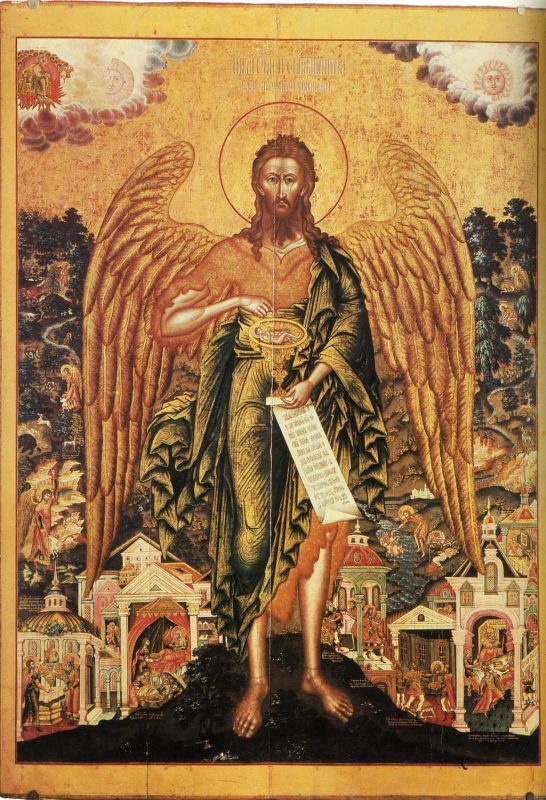
Who was it?
When the Pharisees’ envoys questioned him, he denounced himself: “I” am “a voice crying out in the wilderness, straighten out the way of the Lord, as Isaiah the prophet said” (John 1:23). Let us quote the whole dialogue:
“And this is the testimony of John, when the Jews sent the priests and Levites from Jerusalem to ask him, ‘What are you?And he confessed, and did not deny it; and he confessed that I am not the Christ.And they asked him, ‘What are you?’ Is it Elijah that thou art? and he saith, I am not. Is the prophet thou? and he answered, Thou art not. What sayest thou of him? I am a voice crying out in the wilderness, and ye shall direct the way of the LORD, as Isaiah the prophet said. And the messengers were of the Pharisees; and they asked him, and said unto him, What dost thou baptize, if thou be not the Christ, nor Elijah, nor the prophet? John answered and said unto them, I baptize in water; and he that is in the midst of you baptized, which ye know not. This is he that came after me, which was made before me, and I am not worthy to loose the strap of his footwear.These things were done in Bethany beyond Jordan, where John baptized” (John 1:19-28).
What is remarkable in the preaching, in the work and in the whole presence of John is not only that he is mentioned by the prophets but, above all, that his preaching is not addressed exclusively to the Jews; it embraces the whole world, according to what was said by Isaiah and mentioned by the Evangelist Luke “and all flesh shall see the salvation of God” (Lk. 3,6). He came to evangelize, – if you will pardon the expression – to “preach” by edifying and preparing the people; he came to proclaim the glad tidings of the coming of the Messiah, to continue the angelic praise of that joyful night of the incarnation of the Saviour in Bethlehem of Judea !
St. John’s purpose, then, was not only to make a way for the Lord to pass through, but he hastened to demonstrate the Messiah among the false messiahs of previous and later generations. This is the effort of the missionaries today and in every age. There came the prophet, the forerunner, the man of the Old and New Testament, the man recognized and accepted by men to cry out that revelatory “behold” in meeting Jesus. “Behold the Lamb of God who causes the sin of the world. “He is that which I have spoken of: behind me cometh again that which is before me, that which is before me. I have not seen him, but he was manifested to Israel, wherefore I came baptizing in water” (John 1:29-31). He came to lead His disciples to Christ, as the following incident testifies: “Again the next day John came in, and two of his disciples, and, behold, when he saw the Lamb of God walking, he said, Behold the Lamb of God; and the two disciples heard him speaking, and followed him” (Jn. 1:35-36). And when he was then informed that the people were going to Jesus and not to him, then without selfishness, selfishness, envy or any other negative emotion, fully submitting to God’s plan, he responded with boldness: “a man can receive nothing, except it be given him from heaven: these men testify unto me that I said, I am not the Christ, but am sent from before him.He that hath the bride is a bridegroom: but the friend of the bridegroom, which heareth and heareth him, rejoiceth with joy because of the voice of the bridegroom. (John 3:23-30).
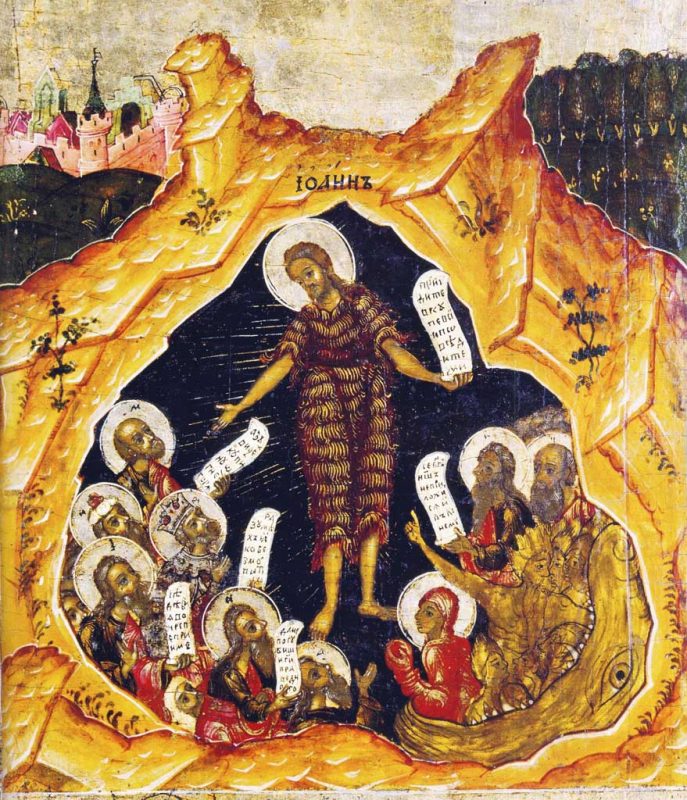
John’s example prompts St. Gregory Palamas to comment on : “Not only in words but also in deeds John revealed Jesus to all, baptized him, pointed him with his finger, introduced him to his disciples and testified with all things that he is the Son of the Father, the Lamb of God, the bridegroom of the souls that come to him,… offering and giving sanctification. And having thus prepared his way according to the foreknowledge of Zacharias, and performed all those things for which he was sent and exhorted and was baptized in the Jordan, he gives Christ the exhortation and teaching to those assembled, and departs from the multitude, delivering them to the Lord”[8]. Therefore, the saint also teaches us – whoever and in whatever way is engaged in the work of evangelization – that the work is not ours but God’s and it is Him whom the evangelizers need to love, to connect with, believe and trust.
However, even after his discreet retirement from the preaching scene, John continues his work. He checks Herod for his promiscuous and philandering life, for his brother’s wife who had taken her as his own. On account of this severe criticism which he had been boldly making of the king’s person he is arrested and imprisoned. He makes enemies of the cunning Herodias and her daughter Salome, who, taking advantage of Herod’s human weakness, manage to ask for and take the Saint’s head “by table” (Matt. 14:11).
The all-knowing, all-knowing Jesus praised John, highlighting his personality and his entire work with this wonderful phrase: “I say not to you, do not be born of women like John the Baptist” (Matthew 11:11).
Today (February 24) our Church commemorates the first and the second finding of the head of the holy glorious prophet and baptist John the Baptist. As St. Nicodemus informs us, the first was carried out in the house of Herod by two monks who were going to worship the tomb of Jesus in Jerusalem, while the second was achieved in the city of Emesa by the archimandrite Marcellus in 431 A.D.[9].
In conclusion, it is worth quoting the beautiful and instructive preface that St. Gregory Palamas attempts to make when he says: “For this reason also the forerunner and baptist of the Saviour, cut off at the head by striving for virtue, who was not only a forerunner of Christ, but also of his Church and even of our own state, brethren. He was born of a barren woman, Elizabeth, and we were born of the Church from among the Gentiles, of whom it is written, “Rejoice, O barren woman, that thou hast not given birth; make a loud voice and cry, thou that hast not tasted odin; for more are the children of the unmarried woman than of her that hath a husband” (Is. 54:1). It was him after the birth that the infanticide Herod persecuted with murderous fury, fighting also against him because of his hatred of Christ, but he found refuge in the wilderness… He also attacks us after the spiritual birth, the imaginary Herod, persecuting also Christ at last because of us”[10].
On February 24 of each year, the first and the second finding of the head of the holy and glorious prophet John the Baptist is commemorated.
Apolytikon
Sound d’. Quick foreshadowing.
Out of the earth the head of the Baptist rose up, to the rays of incorruption, to the faithful of the healers; above it gathers the multitude of angels, below it gathers the race of men, with one voice, to the glory of Christ.
[1] Stergios Sakkou, Interpretation of the Gospel of Luke, “Christian Hope”, t. 1, Thessaloniki 2008, p. 33.
[2] Venedictus Ieromonachos, Palamikon taμείon, ed. “Synodia Spyridonos Hieromonachos”, Mount Athos 2007, p. 832.
[3] Venedictus Ieromonachos, Palamikon taμείon, ed. “Synodia Spyridon hieromonachos”, Mount Athos 2007, p. 833.
Paraskevas Zografou, Sermons of truth and life, vol. 5, Athens 2003, p. 58.
[4] Romano Guardini, The Lord, “Damascus”, 1983, p. 27.
[5] Sava Iliadi, The Holy Forerunner and the joy of missionary work, https://antexoume.wordpress.com/2015/10/10.
[6] Stergios Sakkou, Interpretation of the Gospel of Luke, “Christian Hope”, t. 1, Thessaloniki 2008, p. 137.
[7] Cyril of Alexandria, Luke, PG 72, 512B.
[8] Venedictus Ieromonachos, Palamikon taμείon, ed. “Synodia Spyridon hieromonachos”, Mount Athos 2007, p. 834.
[9] Nicodemus Agionritos, Synaxaristis, ed. “Orthodox Kypseli”, vol. 3, Thessaloniki 2002, p. 315.
[10] Venedictus Ieromonachos, Palamikon tamikon, ed. “Synod of Spyridon hieromonachos”, Mount Athos 2007, p. 836.

